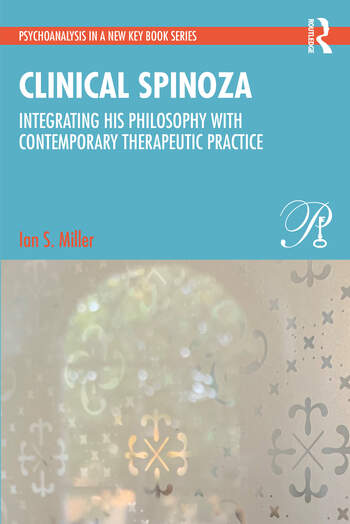Clinical Spinoza: Integrating His Philosophy with Contemporary Therapeutic Practice

Book Details
- Publisher : Routledge
- Published : 2022
- Cover : Paperback
- Pages : 332
- Category :
Psychoanalysis - Catalogue No : 96512
- ISBN 13 : 9781032159348
- ISBN 10 : 1032159340
Reviews and Endorsements
'Clinical Spinoza is one of those works which will stand the test of time. It belongs to a modest tradition of scholarly work which enhances a discourse long forgotten in the history of psychoanalysis - the influence of the Latin and Hebrew philosophical worlds as they manifest themselves through the work of Baruch Spinoza.
In this fascinating book, Ian Miller illustrates how Spinoza's thought corresponds greatly with psychoanalytic thinking. Miller generates a concordance of psychoanalytic concepts as observed through a Spinozan lens. Consider how the center of Spinoza's human psychology is analogous to the modern Winnicottian concept of going on being (Winnicott, 1960), or how Spinoza's psychological conatus corresponds to Freud's libido. In fact, Miller asserts that the Ethics itself, might be seen as a rigorously clarifying commentary upon psychoanalysis in its contemporary expression. He brilliantly reviews how different analysts found different interpretations of Spinoza according to their world views and own values. Miller helps us see clearly and understand how Spinoza's ideas are deeply embedded in psychoanalytic thought. A fascinating book - truly among the best that I have ever read. ' - Aner Govrin, Director of Doctoral "Psychoanalysis and Hermeneutics" Program, Bar-Ilan University, Israel.
'With Clinical Spinoza Ian Miller provides us with an exposition rarely found; mining the Ethics of Spinoza he painstakingly reveals a synchronicity with psychoanalytic concepts and thinking which illuminates the field anew. Miller builds fascinating arguments of congruence from Spinoza to Freud, Lou-Andreas Salome, Victor Tausk to Klein, Bion, Fromm and to present day Interpersonal Psychoanalysts, most notably Edgar Levenson. We are shown how the fields of religious thought (Judaism in particular), philosophy and psychoanalysis are linked as evolving ideas and pursuits. The breadth and undertaking of his enterprise is impressive. Miller's project is one of rediscovery, of re-linking and transformation.' - Jill Salberg, Ph.D., ABPP.
'According to Lou Andreas-Salomé, Spinoza was the "philosopher of psychoanalysis" who demonstrated that "physical and mental manifestations are representations of one another," while Freud in a 1931 letter acknowledged his "dependence on Spinoza's doctrine," although he did not "expressly mention" Spinoza's name. In guiding the reader on what he calls a "journey of actions and ideas across time," Ian Miller takes us backward to show how Freud found in Heine and Spinoza two "fellow un-believers," and forward to link Spinoza's thought with that of Bion and Winnicott. Spinoza emerges from Miller's capacious study as the delineator of a "practical philosophy," which, like clinical psychoanalysis, is meant to point the way "toward personal and societal betterment."' - Peter L. Rudnytsky, University of Florida and Chicago Psychoanalytic Institute, author of Mutual Analysis: Ferenczi, Severn, and the Origins of Trauma Theory

